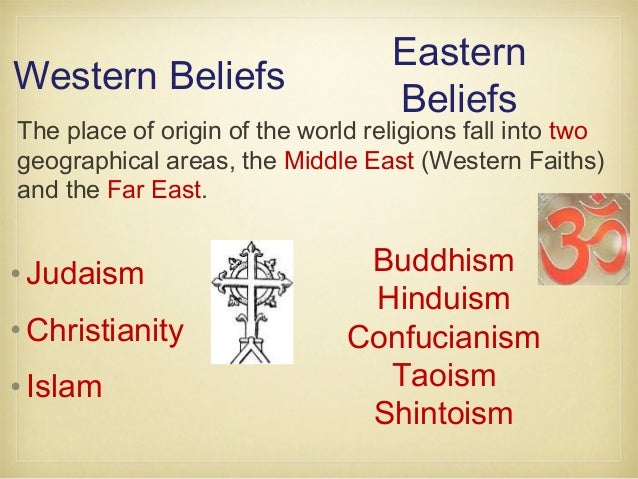Christianity is in the first place an oriental religion, and it is a mystical religion.
(J.C. Barrois, Roots of Christian Mysticism, Introduction)
“Western” is not necessarily a negative label, far from it! Western science is what gave us modern physics, relativity, quantum physics and with it our computers, cells phones, GPS systems, high-tech medicine etc. The strength of the Western mind is that it is analytic: it break things down into smaller and small components, until the mystery if fully explained, until the problem is fully solved.
However, there are serious problems and limitations that come with his Western mindset including legalism, excessive rationalism, utilitarianism, and a grave inability to embrace the mysterious and the holistic. Another aspect to this reflection is that a lot of people think that Christianity is absolutely “A Western religion” (whatever that means), for example in a typical slide taken from Google images:

But even as this slide admits, all of these religions are in fact Eastern, either from the middle East or from the far East. If we could draw an imaginary line on a world map, to separate Eastern from Western, it might be said that the somewhere near Bosphorus (which is near Istanbul Turkey) would be a good candidate. In order words, Christianity itself exists in two forms, as can be detected from the typical names given the various Christian bodies:
- Roman Catholic Church (centered in Rome and therefore in the “West”)
- Protestant / Reformed / Evangelical churches (separated from Rome in Western Europe and later on in the United States)
- Eastern and Oriental Orthodox Churches (with their roots, continuity and continued existence in “the East”)
For some people, discovering that Christianity is in fact an Eastern / Oriental faith (or at least that it does continue to exist with these roots and mindset) is in itself a form of good news. The Orthodox Church is often called “Eastern Orthodox” for a reason: it has preserved the mindset of the Easter where Christianity was born. Does it really matter?
Two example with suffice it illustrate: the book of Revelation (last book of the Bible) requires an Eastern mindset to make any sense (and it was written in the Island of Patmos in the East, and remains an Orthodox monastery to this day). A Western (often Protestant) reading of the book results in wild speculations about future events with predictions of doom that always seem to fail.
Another example is the desire of the Western mind to analyze and explain: where the East embraces mystery and the ‘unspeakable,’ the Western wishes to explain, exposes and break down into explanatory parts.
All too often, Westerns seek truth and meaning in the East, as in India and the Far East, if only to escape the perceived Western mindset of Christianity. It does not have to be so. Christ is truly the light of the East and the Eternal Way.








